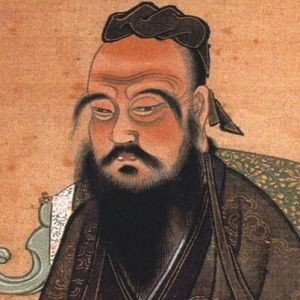Fiascos of Unparlimentary Language
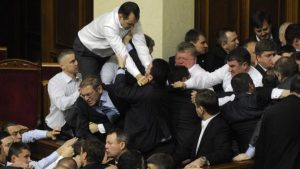 Parliaments and legislative bodies in various countries in the world impose certain rules and principles during debates. Conventionally, there are words or phrases that are deemed unsuitable for use in the parliament whilst it is in session. In a Westminster system (democratic parliamentary system) this is called unparliamentary language and there are comparable rules in other kinds of legislative system. It’s considered unparliamentary to accuse another honorable members of lying, even if they are liars. Winston Churchill famously used the phrase “terminological inexactitude” to get around this rule.
Parliaments and legislative bodies in various countries in the world impose certain rules and principles during debates. Conventionally, there are words or phrases that are deemed unsuitable for use in the parliament whilst it is in session. In a Westminster system (democratic parliamentary system) this is called unparliamentary language and there are comparable rules in other kinds of legislative system. It’s considered unparliamentary to accuse another honorable members of lying, even if they are liars. Winston Churchill famously used the phrase “terminological inexactitude” to get around this rule.
In another famous example, according to legend, Benjamin Disraeli was told off by the commons speaker for declaring that half of the cabinet were “asses” – and responded to his censure with perhaps the greatest joke in political history. “Mr. Speaker, I withdraw” he said. “Half the cabinet is not asses.” Benjamin Disraeli was sharp indeed.
Well, what constitutes unparliamentary language is generally left to the discretion of the Speaker of the House. Part of the speaker’s job is to implement the assembly’s debating rules, one of which is that members may not use “unparliamentary” language. Legislatures must not offend the dignity of the assembly. In addition, legislators in some places are protected from prosecution and civil actions by parliamentary immunity which generally stipulates that they cannot be sued or otherwise prosecuted for anything spoken in the legislature. As a result they are expected to avoid using words or phrases that might be seen as abusing that immunity. There is a lot of slashing and thrusting which happens on the floor of Parliament’s Debating Chamber, it’s quite an ugly scene on the floor. Often, the parliamentary sessions are famous for ‘legislative violence’ which broadly refers to any aggressive clashes between members of ruing government and opposition. Inside the legislature often arguments get triggered by discordant issues and tight votes. Such clashes sometimes become so ugly that members even beat up each other. Parliaments of many countries have noted such incidents and they still regularly occur.
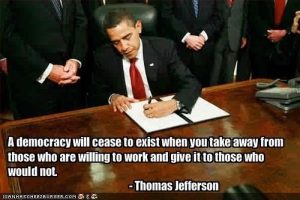 There are rules about what can and cannot be said. Members of Parliament (MPs) must not use indecent language, personal reflections and insults. They cannot use offensive body language either. They cannot suggest unacceptable motives nor accuse other members or the government of bribery, corruption or dishonesty; and they must not challenge the truthfulness of another MP. This sounds so phony, that even if some MP is found guilty of dubious fraud, he must not be accused by another MP.
There are rules about what can and cannot be said. Members of Parliament (MPs) must not use indecent language, personal reflections and insults. They cannot use offensive body language either. They cannot suggest unacceptable motives nor accuse other members or the government of bribery, corruption or dishonesty; and they must not challenge the truthfulness of another MP. This sounds so phony, that even if some MP is found guilty of dubious fraud, he must not be accused by another MP.
Now, policing these fragile rules can be a tough job for the Speaker. Many MPs have had to withdraw ‘unparliamentary’ words and phrases and apologies. Some have pushed the boundaries of the meaning of bad language by using expressions that conveyed their intent without attracting the Speaker’s attention. Speakers were wise to this, though, and in the 1930s a reference of unparliamentary language was compiled.
It’s really sad that we elect MPs for doing good work and help us grow; and what do they do? After election they become larger than life, and forget their promises. These thick skinned, discourteous bunches of politicians use foul language in shoddier and shameful manner and sadly they are the ones who run the nation on behalf of us. Sorry, but we hardly find legislatures with stately image these days. A parliament floor is like any other workplace; the MPs are prone to stress and anger. The confrontational nature of politics and the high stakes often add to the fizzy tensions. There are umpteen examples legislative violence; right from assassination of Julius Caesar by Brutus in ancient Rome.
In Bolivia in 2007, an ugly fight which broke out in the lower chamber of the national legislature; the fight erupted during a debate over whether or not to try four judges on corruption charges.
In 2010, in Nigeria a fight broke out in the National Assembly after a group of members were suspended for accusing the speaker of corruption.
In Peru in 2006, Congresswomen Nancy and Elsa did not approve the free trade agreement with the United States. For that reason, they tried to escape punching and kicking the Congress security. They were suspended for 120 days from the legislature for the violent acts.
In May 2004, in Taiwan Lawmakers Chu Hsing-Yu and Lai Ching got into a brawl over legislative procedures. TV stations showed Chu grabbing Lai and trying to wrestle him onto a desk. He then tried to head butt his colleague before jabbing him in the stomach. The brawl resulted in having a traffic policeman called into the chamber to test Chu’s alcohol level, after he was accused of being drunk. The tests showed no sign of alcohol influence.
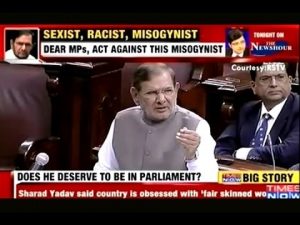 And in India recently, the controversy over the sexist remarks of Janata Dal-United leader Sharad Yadav refused to die down as he remains unapologetic in the Rajya Sabha that witnessed uproar over his insubordinate attitude. With Human Resource Development Minister Smriti Irani appealing to him not to bring in issues like colour of women, the JD-U leader retorted in a tone of scorn, “Who are you? Why should I apologize? I raised a very important issue of discrimination on colour.” So Yadav thinks of himself as a ‘Hero’. These and many such incidents lead us to feel sorry about state of affairs.
And in India recently, the controversy over the sexist remarks of Janata Dal-United leader Sharad Yadav refused to die down as he remains unapologetic in the Rajya Sabha that witnessed uproar over his insubordinate attitude. With Human Resource Development Minister Smriti Irani appealing to him not to bring in issues like colour of women, the JD-U leader retorted in a tone of scorn, “Who are you? Why should I apologize? I raised a very important issue of discrimination on colour.” So Yadav thinks of himself as a ‘Hero’. These and many such incidents lead us to feel sorry about state of affairs.
It’s worth noting that in Australian Senate the words “liar” and “dumbo” were ordered to be withdrawn and deemed unparliamentary during a session in 1997.
In Canada, these are some of the words and phrases that Speakers through the years have ruled “unparliamentary.” parliamentary pugilist (1875), a bag of wind (1878), inspired by forty-rod whiskey (1881), coming into the world by accident (1886), blatherskite (1890), the political sewer pipe from (1917), lacking in intelligence (1934), a dim-witted saboteur (1956), liar (consistently from 1959 to the present) and hypocrisy, hypocrite. Isn’t it amusing?
The President of the Legislative Council of Hong Kong in 1996 ordered out for using some of phrases such as ‘Foul grass grows out of a foul ditch, when referring to some of the members.
In 2012, the Indian Parliament published a book of words and phrases that were considered to be unparliamentary: Bad Man, Badmashi, and Bag of shit, Bandicoot, Communist, Double-minded, Goonda, Rat, Ringmaster, Scumbag and Chutzpah – hilarious indeed.
In Ireland, the lower house of the Parliament has ruled that it is disorderly for one legislature to use words such brat, buffoon, chancer, communist, corner boy, coward, fascist and rat etc against another legislature.
And, do you know in Belgium there is no such thing as unparliamentary language. A member of parliament is allowed to say anything he or she wishes when inside parliament. This is considered necessary in Belgium to be able to speak of a democratic state and is a constitutional right.
Shekar Kapur, the famous film director twitted recently that the blame game in Parliament is making mockery of democracy as it consumes minds of people that are supposed to lead nation.
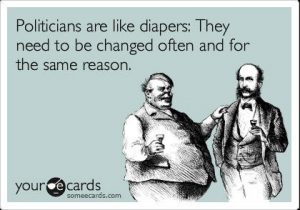 Mark Twain’s famous quote “Politicians and diapers should be changed often, and for the same reason.” This was slightly altered by California Libertarian candidate John Wallner used the line often in 1992. “Politicians and diapers should both be changed regularly, and for the same reason” is a saying that has appeared on bumper stickers, but is of unknown origin. The popular saying (implying that both politicians and diapers start clean, but quickly become full of stuff) has been cited in print from at least 1992.
Mark Twain’s famous quote “Politicians and diapers should be changed often, and for the same reason.” This was slightly altered by California Libertarian candidate John Wallner used the line often in 1992. “Politicians and diapers should both be changed regularly, and for the same reason” is a saying that has appeared on bumper stickers, but is of unknown origin. The popular saying (implying that both politicians and diapers start clean, but quickly become full of stuff) has been cited in print from at least 1992.













































